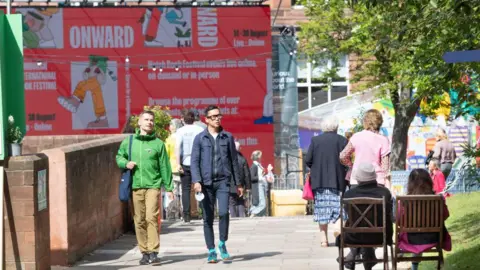[ad_1]
Craig Williams,BBC Scotland News
 Getty Images
Getty ImagesThe Edinburgh International Book Festival has ended its 20-year funding partnership with sponsors Baillie Gifford after pressure from climate change protesters.
The move follows a similar decision by the Hay Festival in Wales last week.
The investment company, which is based in Edinburgh, has been a major sponsor of UK arts events but has come under scrutiny for its investments in fossil fuels.
Book festival chairman Allan Little said they could nor deliver a safe and sustainable festival in August with the constant threat of disruption from activists.
The protests began when more than 50 authors called on the festival to end its deal with Baillie Gifford in 2023, after climate change activist Greta Thunberg cancelled an appearance at the event.
The then festival director, Nick Barley, warned the organisation would not have enough money to operate without private sponsorship.
In a statement released on Thursday, Baillie Gifford’s Nick Thomas said: “The activists’ anonymous campaign of coercion and misinformation has put intolerable pressure on authors and the festival community.
“We step back with the hope that the festival will thrive this year and into the future.
“We hold the activists squarely responsible for the inhibiting effect their action will have on funding for the arts in this country.”
 Getty Images
Getty ImagesPressure has mounted on the organisers in recent weeks after the protest group Fossil Free Books turned its attention to the long-running Hay Festival.
The group attacked the festival for its links with the investment firm, saying it has links to fossil fuel firms and Israel.
Artists including Charlotte Church and Nish Kumar pulled out of appearing at the prestigious festival in protest at the deal.
More than 700 publishers and writers including writers George Monbiot, Max Porter and Michael Rosen have signed an online statement calling on festivals to end their links with Baillie Gifford.
Allan Little, chairman of the Edinburgh International Book Festival, said: “Our team cannot be expected to deliver a safe and sustainable festival this August under the constant threat of disruption from activists. This was a pragmatic response to that reality.
“Funding for the arts is now in a perilous position and we should all be clear that without the support of our partners and donors, the future of festivals like ours – and all of the benefits these events bring to authors and readers alike – is in jeopardy.”
‘Progessive and nuanced discussion’
Mr Little said the festival was a charity and an “important platform” which allows people of all views to debate.
“Book festivals around the world are forums in which rigorous, intelligent debate can take place. Our festival should be a place where progressive and nuanced discussion can happen in a safe and respectful space,” he said.
“Indeed, our programme this year is designed to give a voice to those directly affected by conflict and those engaged at the most senior levels in its resolution. We will explore the real challenges involved in transition, green tech and climate finance, misinformation and the need for new economic models.
“We are determined to have those debates and to have them out in the open, but we need everyone to come to the table.
“We have made several invitations to Fossil Free Books, and other groups, to attend this year’s festival and regret that they have not responded to those offers,” he added.
The festival’s chief executive, Jenny Niven, said the mutual decision to end the partnership was a source of great regret.
“The pressure on our team has simply become intolerable. We have a major global festival starting in 10 weeks’ time and we need to focus all of our efforts and energy on delivering a safe and successful event for our audiences,” she said.
“Undermining the long-term future of charitable organisations such as book festivals is not the right way to bring about change.
“It diminishes the voices of those who feel strongly about these complex issues, and it will be infinitely harder to build and sustain well-funded cultural institutions in the future than it is to put them out of business today,” she added.
Disinvestment ‘serves no purpose’
Nick Thomas, a partner at Baillie Gifford, said: “Our collaboration with the Edinburgh International Book Festival, spanning decades, was rooted in our shared interest in making Edinburgh a thriving and culturally vibrant place to live and work.”
He said the firm had supported the schools and children’s programmes, providing free books – and he defended Baillie Gifford’s ethical record.
“The assertion that we have significant amounts of money in the Occupied Palestinian Territories is offensively misleading. Baillie Gifford is a large investor in several multinational technology companies, including Amazon, NVIDIA, and Meta,” he said.
“Demanding divestment from these global companies, used by millions of people around the world, is unreasonable and serves no purpose. Much as it would be unreasonable to demand authors boycott Instagram or stop selling books on Amazon.
“Nor is Baillie Gifford a significant fossil fuel investor. Only 2% of our clients’ money is invested in companies with some business related to fossil fuels. We invest far more in companies helping drive the transition to clean energy.”
He added: “We remain committed to contributing positively to our community through philanthropic support.”
[ad_2]
Source link




